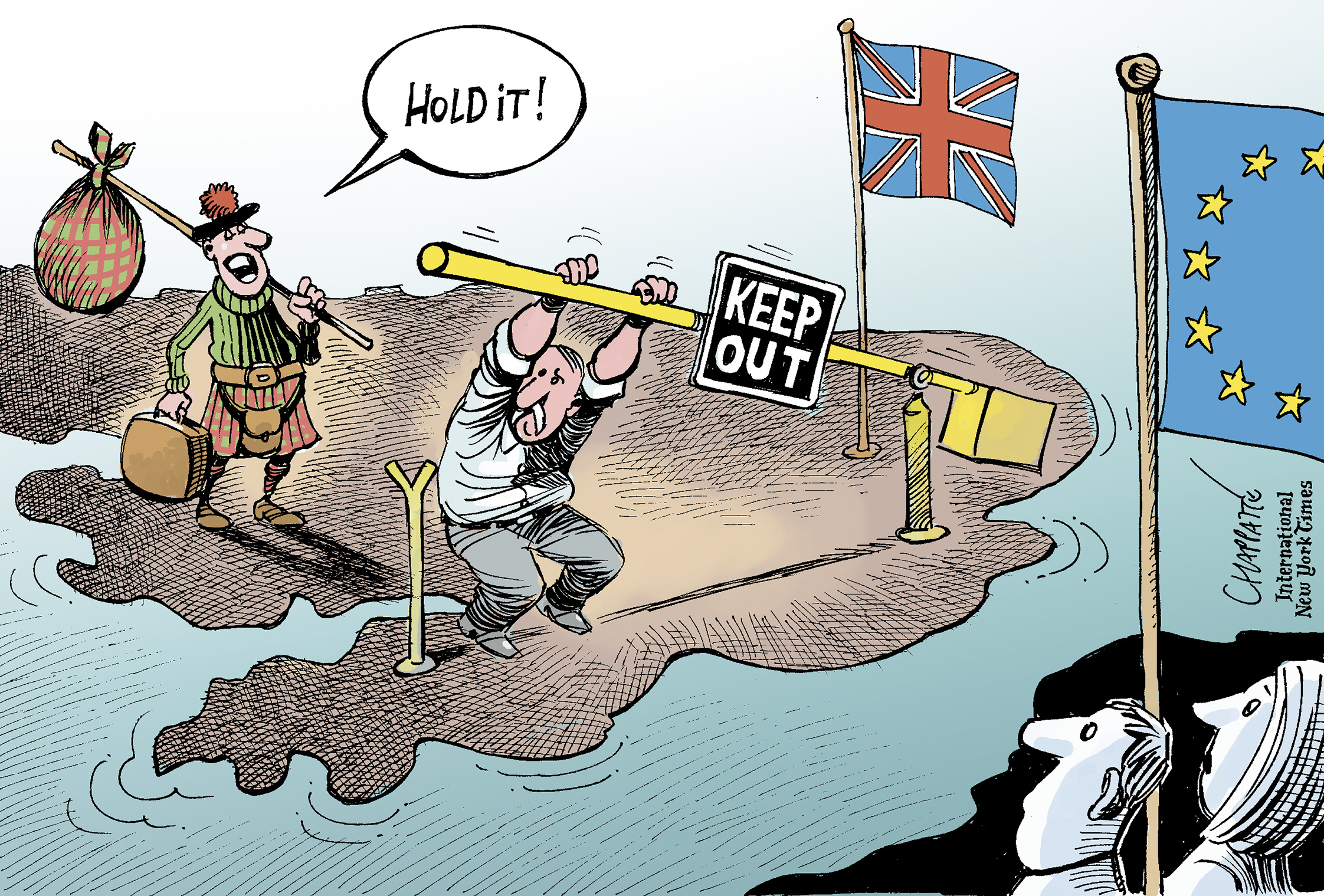As Brexit wraps up, Scotland leaves the EU against its peoples’ will.[1] Implicitly, the EU decided that continuing to recognize Scots as EU citizens would unlawfully disrespect British sovereignty.[2] The decision represents a remarkable (if not surprising) victory for nationalism.[3] The decision means that, when weighing the competing interests of nations and citizens, the EU does not give any cognizable weight to the interests of its loyal citizens unless those interests are expressed by a sovereign member nation.
Nearly thirty years since its ratification, The Maastricht Treaty’s aspirational character, rather than a functional one, has never been more apparent.[4] The European Union’s signatories “[resolved] to establish a citizenship common to nationals of [member] countries;” but despite Scottish opposition to Brexit, the European Union will disenfranchise Scottish nationals from EU citizenship.[5] The EU masterfully avoids damaging the plastic bars of its Westphalian nation-state crib. And so, the spirit that stifled the 2004 EU Constitution, which would have guaranteed a balance between the interests of citizens and nations, has matured.[6] In the struggle between a nation-based or a cosmopolitan Europe, the nations have won and European citizens have lost.[7] Meanwhile, Scotland suffers.
Scotland’s people have consistently voiced their desire to remain citizens of the EU. In 1975, when the United Kingdom held a referendum on whether to remain a member of the EU’s predecessor (the European Economic Community), 67% of eligible Scottish voters voted, with 58% electing to remain with Europe. In 2014, 85% of eligible Scottish voters voted with 55% voting against independence from the UK; independence would have meant losing EU citizenship.[8] And, in 2016, 67% of eligible Scottish voters voted with 62% voting for remaining in the EU.[9] However, by choosing to remain part of Britain in 2014, Scottish voters stripped their 2016 votes to remain in the EU of any potency. England’s numerosity prevailed.[10]
Scotland will likely become an independent nation with the aim of joining the European Union. Surely, a portion of the 55% majority who voted to remain with the UK in 2014 were actually voting to remain with the EU (as supported by Scotland’s Brexit vote).[11] In the ensuing decade or so of debate and procedure, Scotland may lose the cornerstones of EU citizenship: free movement and free trade throughout Europe.[12] For example, Scotland’s fisheries may suffer.[13] Scottish politics have become increasingly dominated by nationalists with acrimonious relations with Westminster, whose conservative-led government seem secure in its power for the foreseeable future.[14] Ironically, nationalism, the force traditionally antithetical to the EU, the force that divorced Scotland from the EU, may spearhead Scotland’s independent accession into the EU.
However, Scotland may not be able to meet the EU’s membership criteria after independence.[15] How can a newly independent Scotland prove that it is “politically stable” or that it can “compete with market forces” while in limbo between UK and EU memberships?[16] Under Article 49 accession procedure, the EU would not accept Scotland with its current debt— 7% of GDP— because the EU has set a ceiling of 3%.[17] Although some EU leaders have intimated that an independent Scotland would be welcome, in reality, there is a wide consensus that the EU will not offer special treatment.[18]
Instead of erring on the side of inclusivity, the EU has simply erred. Brushing off Scotland not only encourages Scottish independence, it encourages separatism elsewhere. The precedent is concerning. Many EU citizens— and especially minorities like immigrants and Roma— do not live in geographic regions that are so neatly divisible as Scotland is. Brexit has clarified that EU citizenship withers without national support, which minorities often lack. Because Scots are not afforded EU citizenship rights post-Brexit, Scotland will have to find its own way back into the EU through the vital sovereign nation status, or not at all.
- EU REFERENDUM Results, BBC, https://www.bbc.com/news/politics/eu_referendum/results. ↑
- See Empathy’ for independent Scotland joining the EU says Tusk, BBC (Feb. 2, 2020), https://www.bbc.com/news/uk-scotland-scotland-politics-51342714. ↑
- E.g. J. H. Weiler, Scottish Independence and the European Union, 12 Int’l J. Const. L. 507 (2014). ↑
- Maastricht Treaty, TEU or Union Treaty: Treaty on European Union, 1992/2, 1992 O.J. (C 191) 1 (EC). ↑
- Id. ↑
- Treaty Establishing a Constitution for Europe, Rome, 2004/10, 2004 O.J. (C 310) 1 (EC). This Treaty did not enter into force. ↑
- Espen Olsen, The Reconceptualization of European Union Citizenship 344 (Elspeth Guild et al. eds., 1st ed. 2014). ↑
- Scotland Votes No, BBC, https://www.bbc.com/news/events/scotland-decides/results. ↑
- UK Votes to Leave the EU, BBC, https://www.bbc.com/news/politics/eu_referendum/results. ↑
- EU REFERENDUM Results, BBC, https://www.bbc.com/news/politics/eu_referendum/results. ↑
- See Martin Currie, Would Scotland be in the EU after a ‘Yes’ Vote?, BBC (Apr. 29, 2014), https://www.bbc.com/news/uk-scotland-scotland-politics-26173004. ↑
- See Rachel Schraer Brexit: What changes for EU and UK citizens living abroad?, BBC (Feb. 1, 2020), https://www.bbc.com/news/uk-49973387. ↑
- Elisabeth O’Leary, Less Scottish fish for EU Diners without Brexit Deal, REUTERS (Jan. 31, 2020), https://www.reuters.com/article/uk-britain-eu-fishing/less-scottish-fish-for-eu-diners-without-brexit-deal-fishermen-idUSKCN1PP2AF. ↑
- See Jamie Maxwell, A New Scottish Independence Vote Seems All but Inevitable, FP (Jan. 24, 2020). ↑
- Maastricht Treaty, art. 49 (EC). ↑
- Id. ↑
- Angus Armstrong and Monique Ebell, Assets and liabilities and Scottish independence, 30 Oxford Rev. of Econ. Pol’y. 297, 297–309 (2014). ↑
- Fabian Zuleeg, The EU’s Scottish Question, European Policy Center (June 18, 2019) Policy Brief ,1, https://wms.flexious.be/editor/plugins/imagemanager/content/2140/PDF/2019/EUScottishquestion.pdf. ↑


